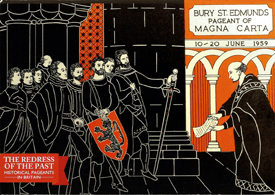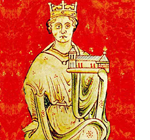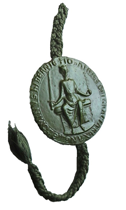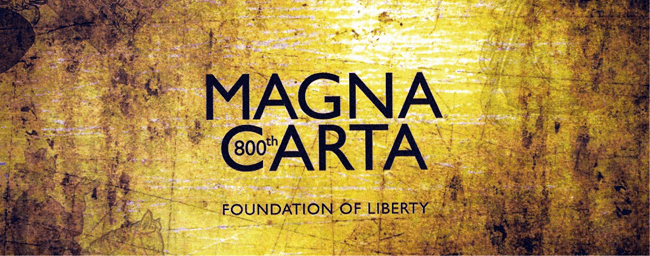- Home
- About Us
- The Great Charter
of Bury St Edmunds - The Magna Carta
- The Pageants
- Events
- Past Events
- Resources and Links
- Photo Gallery
- Rebecca’s Magna Carta Blog
Pageants Exhibition at Moyse’s Hall 4 May to 28 August 2015 FREE

The Magna Carta
King John is popularly remembered as the bad king in the story of Robin Hood. His reign saw disputes with the Pope and the barons and also military losses. On the 15th of February 1214, King John arrived in France for his last and most disastrous campaign. Its failure led to rebellion and, in 1215, to the sealing of Magna Carta.

John quarrelled with Pope Innocent III over the appointment of the new Archbishop of Canterbury, Stephen Langton. In 1208 the Pope put England under an interdict. The English people were terrified at being cut off from the church and John was blamed. The Pope excommunicated John in 1209. |

|

|
John disagreed with the barons over increased taxes and feudal dues. He charged large reliefs when a son inherited an estate, he exploited the lands of his wards, he sold the marriages of heiresses and he gave important positions to his foreign relatives and was responsible for many actions of cruelty. |
By granting Magna Carta, John had allowed the power of the king to be limited by a written document. This had never happened before, but John was just playing for time. In July he sent envoys to Innocent III seeking an annulment of the charter. The Pope issued a document, known as a papal bull, declaring it null and void. Magna Carta had been legally valid for only ten weeks. Within months, England was embroiled in an even worse civil war than the one which Magna Carta had sought to avert. In October 1216, John died suddenly in Newark, having failed to recover from his attack of dysentery. |
 |
In 1297 the text of the 1225 reissue of the Magna Carta was copied on to the first statute roll. This meant that, despite the revisions made in the decade following 1215, the core of the barons’ programme agreed at Runnymede had been officially incorporated into English law.
 |
Orders were made for it to be read twice a year in county courts from 1265, and twice yearly in cathedrals from 1297. It was routinely read and confirmed at the opening of each parliament, and in 1341 parliament required the officers of state to swear to observe its terms. The mid-fourteenth century also saw six acts of parliament reinterpreting the famous clause relating to justice, so that 'the lawful judgement of peers' was redefined as trial by peers and therefore trial by jury. The kings of the later Middle Ages continued to issue confirmations of Magna Carta, but it was during the seventeenth century that its significance underwent a profound shift when lawyers argued that it stated fundamental principles of law. |
The original Great Charter was agreed by King John, 15th June 1215, when he acceded to barons' and bishops' demands to limit his powers, first sealed on 19 June 1215 and distributed throughout the land.
The 1215 version of Magna Carta was revised several times in the 13th Century, reissued in 1216 after the death of King John, revised in 1217 and 1225.
The 1297 version was brought into English law, virtually unchanged from the 1225 version. There are 4 known surviving copies of the 1215 Magna Carta – at Lincoln (1) and Salisbury (1) Cathedrals and in London at the British Library (2).
There are 13 known surviving later XIII C. copies - Durham (1216) (1225), Hereford (1217), Oxford (1217x3) (1225), London (1225x2) (1297x2), Canberra, Australia (1297), Washington, DC, USA (1297). And another 6 (or 7?) of the 1300 Magna Cartas in the City of London, Durham Cathedral, Faversham Town Council, Oxford (2), and Westminster Abbey (and Society of Antiquaries in London as well). Making 24 in all we know of. |
|
Why commemorate Magna Carta?

|
The 800th anniversary of Magna Carta is an occasion to deepen the understanding of the crucial role it has played in our development. It is a time to commemorate the individual rights we enjoy today. It is an opportunity to strengthen human rights around the world. |
Magna Carta matters because:
'England's greatest export’
It is the foundation stone of the freedoms enjoyed by hundreds of millions of people in more than 100 countries.
'Due process of law'
It enshrined the rule of law in English society.
'No one is above the law'
It limited the power of authoritarian rule.
'Justice delayed is justice denied'
It paved the way for trial by jury.
'No taxation without representation'
It linked taxation to democratic government; theme of the American Revolution.
'The English Church shall be free'
It proclaimed certain religious liberties:
It has influenced constitutional thinking worldwide including USA, Europe, Commonwealth and in over 100 countries; as well as the UN Declaration of Human Rights.
Denials of Magna Carta's basic principles have led to a loss of liberties and human rights and even genocide in many countries for centuries.
THE MAGNA CARTA 1215
The sixty-three clauses cover a multitude of topics, both general and detailed, in no particular order. The original charter contained no clause numbers, no punctuation and no breaks in the text.
Many clauses were aimed at curbing the abuses of King John’s reign and limited his ability to extort money from the barons through taxes and reliefs relating to wardships, marriages and inheritances. Other clauses dealt with the barons' legal grievances and the rights of free men. The rights of the English Church were recognised. Among other clauses were concessions to merchants and the removal of fish weirs to promote navigation.
Magna Carta clause 39.
No free man shall be taken, imprisoned, be stripped of his rights or possessions, or outlawed or exiled, or deprived of his position in any other way, nor will we act or send against him, except by the lawful judgement of his equals or by the law of the land.
Magna Carta clause 40.
To no one will we sell, to no one refuse or delay right or justice.
These two of the four surviving clauses from the Magna Carta show why it has become so important today. However, at the time they were well down the list and only part of a document that was a solution to a political crisis where the King was in conflict with the barons and the church.
The other two surviving clauses are:
Magna Carta clause 1.
The English Church shall be free, and shall have its rights in full and its liberties unimpaired.
Magna Carta clause 13.
The city of London shall have all its ancient liberties and free customs, both by land and by water; all other cities, boroughs, towns, and ports shall have all their liberties and free customs.
So the Magna Carta was not intended to become the cornerstone of democracy and human rights in England and the world, but that is what it has become. Some key clauses in the document have been interpreted by succeeding generations so that the iconic status of the Magna Carta has been guaranteed.

